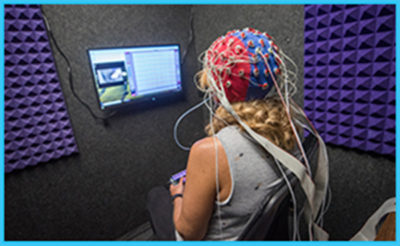
As we age, we naturally experience cognitive declines. We might forget where we parked our car or what we had for breakfast yesterday. But we also gain more experience and knowledge.
Heather Bailey, assistant professor of psychological sciences at Kansas State University, thinks that is important. She is studying how older adults can use their experiences and knowledge to learn new information.
Her project has two groups of people — adults ages 65 to 85 and adults ages 18 to 28 — watch a series of videos that depict everyday activities, such as cooking breakfast, balancing a checkbook or working with technology. Bailey uses eye tracking technology to determine what people pay attention to and uses fMRI, which stands for functional magnetic resonance imaging, to determine what parts of the brain are involved in learning and remembering new information.
“We are finding that when people have relevant knowledge, they are better able to remember the activity in the video,” Bailey said. “However, if they don’t have any relevant knowledge, then chunking the activity into smaller events can improve their memory.”
More than 200 people have participated in this study either on the K-State Manhattan campus or at the Hoglund Brain Imaging Center with the University of Kansas Medical Center.
Bailey is planning further work with people suffering from early onset Alzheimer’s disease or other neurodegenerative diseases.
“Our research could help improve older adults’ quality of life and help them function independently longer,” Bailey said.
But what happens before we age? Can our childhood environments affect our brains as adults?
That’s what Mary Cain, professor of psychological sciences, aims to understand. She studies how childhood environments affect alcohol and drug use in adults.
Through her work with rodent models, she has found that rats raised in an enriched environment with toys and social interaction have lower drug and alcohol intake as adults. Cain also has found that rats raised in an enriched environment are very sensitive to the taste of alcohol and sugar water.
“We know that the early rearing environment causes brain changes, but it’s really novel that it also may be altering taste,” Cain said. “That may have implications for alcohol use in adulthood as well.”
By looking at images of the brain, Cain can better understand how the structure of the brain, specifically parts of the nerves themselves, can affect alcohol use in adulthood. Her work also applies to humans.
“Our research shows that any kind of enrichment provided during childhood is protective against drug and alcohol use in adulthood, and that’s a result of plasticity changes,” Cain said. “Early life enrichment is really important.”
By: Seek Research Magazine, K-State